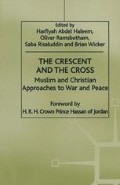Abstract
Do governments have a right, if not a duty, to intervene forcibly to protect indigenous populations in other countries whose own governments are either incapable of defending them or are themselves responsible for the suffering? Both Muslims and Christians are often implicated as aggressors and suffer as victims in these situations. In some cases Christians persecute Muslims (Bosnia); in other Muslims persecute Christians (Sudan); in others again Christians persecute Christians (Croatia) and Muslims persecute Muslims (Iraq).1 Neither faith community is free from blame — and the challenge of what, if anything, to do about it confronts both alike. In this chapter we first consider the question of forcible humanitarian intervention in general, then apply our conclusions to the question of humanitarian intervention in Bosnia.
Access this chapter
Tax calculation will be finalised at checkout
Purchases are for personal use only
Preview
Unable to display preview. Download preview PDF.
Notes
Fernando Tesón, Humanitarian Intervention: An Enquiry into Law and Morality (Dobbs Ferry, NY: Transnational Publishers, 1988), p. 4.
Richard Harries, ‘Human rights in theological perspective’, in R. Blackburn and J. Taylor (eds), Human Rights for the 1990s: Legal, Political and Ethical Issues (London: Mansell, 1991), pp. 1–13 at pp. 6–7.
See, for example, the extensive bibliography on Islam and human rights at the end of Alison Renteln, International Human Rights: Universalism versus Relativism (Newbury Park: Sage, 1990).
The same is true in the West. For example, Michael Walzer abandoned his communitarian objections to the possible justification of intervention when ‘the violation of human rights … is so terrible that it makes talk of community and self-determination … seem cynical and irrelevant’; Michael Walzer, Just and Unjust Wars (London: Basic Books, 2nd ed., 1977/1992), p. 90.
Ephraim Isaac, ‘Humanitarianism across regions and cultures’, in T. Weiss and L. Minear (eds), Humanitarianism Across Borders: Sustaining Civilians in Times of War (London: Lynne Rienner, 1993), pp. 13–22 at p. 13.
‘The sovereign has no earthly judge, for one over whom another holds a superior position is not a sovereign…. Therefore it was inevitable that the decision between sovereigns should be made by arms’; Alberico Gentili, De Jure Belli Libri Tres (New York: Oceana, 1964/1598), p. 15.
Hugo Grotius, De Jure Belli ac Pacis Libri Tres (Oxford: Clarendon Press, 1935/1625), Chapter XX.
See Hedley Bull, Benedict Kingsbury and Adam Roberts (eds), Hugo Grotius and International Relations (Oxford: Clarendon Press, 1990).
John Vincent, Nonintervention and International Order (Princeton: Princeton University Press, 1974), p. 26.
Emmerich de Vattel, The Law of Nations or the Principles of Natural Law Applied to the Conduct and to the Affairs of Nations and of Sovereigns (Dobbs Ferry, NY: Oceana Publications, 1967/1758), introduction.
One example, mentioned in Chapter 1 of this book, was the ambivalence of Gladstone, who swung from stern non-interventionism to the impassioned advocacy of humanitarian intervention to stop the Bulgarian massacres at the time of the Midlothian election. For a fuller account of the humanitarian intervention debate see Oliver Ramsbotham and Tom Woodhouse, Humanitarian Intervention in Contemporary Conflict (Cambridge: Polity Press, 1996), Chapter 2.
Lori Fisler Damrosch, ‘Changing conceptions of intervention in international law’, in L. Reed and C. Kaysen (eds), Emerging Norms of Justified Intervention (Cambridge, Mass.: American Academy of Arts and Sciences, 1993), pp. 91–110 at p. 93.
Thus, for example, J. Boyle, ‘Natural law and international ethics’, in Terry Nardin and David Mapel (eds), Traditions of International Ethics (Cambridge: Cambridge University Press, 1992), pp. 112–35 at p. 123.
See also John Finnis, Natural Law and Natural Rights (Oxford: Oxford University Press, 1980).
Papal pronouncement at the International Conference on Nutrition, 5 December 1992, quoted in R. Coste, ‘The moral dimensions of intervention’, Harvard International Review (Fall 1992), pp. 28–9 and 67–8 at p. 28.
M. Haas, The Asian Way to Peace: A Story of Regional Cooperation (New York: Praeger, 1989).
Quoted in Garry Klintworth, ‘The “right to intervene” in the domestic affairs of states’, Australasian Journal of International Affairs, 46 (1991), pp. 249–66.
A. Al-Ahsan, The Organization of the Islamic Conference (Herndon, VA: International Institute of Islamic Thought, 1988), p. 36.
Sohail Hashmi, ‘Is there an Islamic ethic of humanitarian intervention?’, Ethics and International Affairs, 9 (1993), pp. 55–73 at p. 55.
I. Khan, Muslim News, 26 March 1993, p. 3.
E. Ahmad, Boston Review, June/August 1993, p. 5.
Holy Synod of Bishops of the Serbian Orthodox Church, Appeal to All International Factors, 12 December 1995.
Adrian Hastings, ‘SOS Bosnia’, Theology, 47 (778) (1994), pp. 242–4.
For example, Hugh Beach, ‘Do we need a doctrine of just intervention’, in Council for Arms Control (London: Council for Arms Control, 1993);
David Fisher, ‘The ethics of intervention’, Survival, 36 (1) (1994), pp. 51–9, and ‘The ethics of intervention and former Yugoslavia’, in Roger Williamson (ed.), Some Corner of a Foreign Field (Basingstoke: Macmillan, forthcoming);
K. Himes, ‘Just war, pacifism and humanitarian intervention’, America, 169, 14 August 1993, pp. 10–15, 28–31. Beach and Fisher apply just war criteria to intervention in general, not just to humanitarian intervention.
Reinhold Niebuhr, Moral Man and Immoral Society: A Study in Ethics and Politics (New York: Scribner, 1932), p. 19.
Author information
Authors and Affiliations
Editor information
Editors and Affiliations
Copyright information
© 1998 Palgrave Macmillan, a division of Macmillan Publishers Limited
About this chapter
Cite this chapter
Haleem, H.A., Ramsbotham, O., Risaluddin, S., Wicker, B. (1998). Humanitarian Intervention and the Bosnian Conflict. In: Haleem, H.A., Ramsbotham, O., Risaluddin, S., Wicker, B. (eds) The Crescent and the Cross. Palgrave Macmillan, London. https://doi.org/10.1007/978-1-349-26440-7_7
Download citation
DOI: https://doi.org/10.1007/978-1-349-26440-7_7
Publisher Name: Palgrave Macmillan, London
Print ISBN: 978-1-349-26442-1
Online ISBN: 978-1-349-26440-7
eBook Packages: Palgrave Religion & Philosophy CollectionPhilosophy and Religion (R0)

